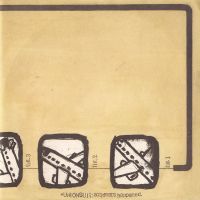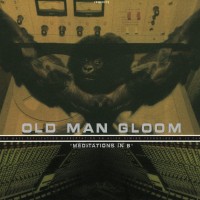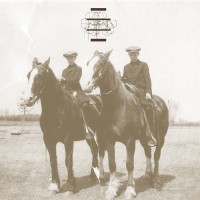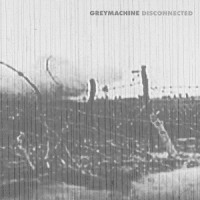Getting Into: Aaron Turner (1997-2009)

| Written by: | RaduP, musclassia |
| Published: | September 27, 2021 |
Click here for Part II.
Radu: The Getting Into formula, first conceived by our own Baz Anderson, was used as a means of going over a band’s discography to better let readers know which releases to check out and which to avoid. This generally just included the main studio albums. And it’s a formula that works pretty well and it’s still used to this day. But we’ve toyed around with adding some secondary releases like live albums, demos, compilations. Or even stuff that is not released by the band itself, but is tangential to the band through lineup connections. But it was always about the band, a name that you can find on the records. And the most we’ve strayed from that is SSUS’ series on Devin Townsend (I, [url= https://metalstorm.net/pub/article.php?article_id=2095]II[/url], III), or the collaborative exploration of everything around and including Sunn O))) (I, II, III). But Devin’s name is on most of his work, and Sunn O))) is a duo. This time, things had to be taken further.
You’ve no doubt heard of Aaron Turner, or at least something that he was involved in. Leftfield experimentalist, ambient sound sculptor, head of Hydra Head Records and Sige Records, post-metal pioneer… it’s likely the last one that rings the biggest bell. As part of Isis, and then Old Man Gloom and Sumac, he was part of a contrast reinvention, honing, and stretching of a brand of atmospheric sludge that eventually added the “post-” to metal. Each of those three bands would be worth discussing, yet neither really offers enough material for a single article, and thus, the running thread is brought into the spotlight instead. And those three are far from the only projects that Aaron has been involved in, even if they are the main focus of the article. So we’ve limited ourselves to a maximum of one album from each project in each article.
From New Mexico to Boston to Los Angeles to Washington (the state, not DC), this is the mostly metal journey of Aaron Turner.

Unionsuit - Accidents Happened (1997)


Prior to forming Isis and since moving to Boston, Aaron had been part of Unionsuit and Hollomen, and out of these two, Unionsuit is the one who released some material of note. The Accidents Happened EP came after a 1996 demo tape and the three songs on it, making up just over 8 minutes, are some very primitive post-hardcore / screamo, and I mean that both in the good and the bad way. It has a lot of visceral energy, but it’s really underdeveloped. Turner’s guitar playing would only get better after this point, and there would be more opportunities to showcase this punk energy in better places. But it’s far from anything too embarrassing.
by Radu
It’s a startling experience, after listening almost exclusively to their post-2000 material in the past decade, to occasionally return to the start of Isis’s musical journey. This isn’t the very first release from Isis; it was preceded by a demo, the tracks from which were added as bonus tracks to reissues of The Red Sea. However, it is their first official studio release, and the 30 minutes of abrasive, misanthropic sludge here feature none of the warmth and melody of the band’s more renowned albums. The only official release from the band lacking Michael Gallagher on second guitar, Aaron Turner makes more than enough noise with one guitar, combining grim low-end aural violence with primal vocals, which range from Turner’s now-infamous roars to more sickly high-pitched shrieks. Still exhibiting signs of post-metal’s evolution from the sludge scene popularized by bands from New Orleans, there’s some blues-y guitar work on “Hive Destruction” to go with the harsh noise that has carried on into Old Man Gloom and the grating sludge. Not an easy or fun listen, Mosquito Control is a very different beast to the likes of Oceanic or Panopticon, but whilst fans of those albums may find the grimness here a bit too much, for fans of harsher sludge it’s a noteworthy early benchmark in that sound, one that is also notable for being one of the only studio releases from the band produced by Kurt Ballou of Converge.
by Matt
One more EP before really taking the world by storm, The Red Sea was, if anything, even more abrasive than Mosquito Control; the opening track “Charmicarmicarmicat Shines To Earth” is just roars, noise and erratic instrumentation (a precursor to Sumac, perhaps). This album saw the first appearance of long-time second guitarist Michael Gallagher, as well as a return on the production end from Kurt Ballou; old and new combined to produce vicious, pummelling sludge. Vocal samples taken from TV show Hotel Room just compound the oppressive atmosphere of this record. There’s times when the album hints at groove or nuance, particularly on the title track, but for the most part this is jagged, ear-piercing sludge. The original 3-song release was repackaged with the four songs that comprised the demo sent out to labels prior to the release of Mosquito Control, which are unsurprisingly even rougher than the tracks on the two official EPs.
by Matt
The debut record from Isis saw the band finally in the form that they existed in for the rest of their career, with Bryant Clifford Meyer taking over electronic duties. The shift from EP to debut record saw the first signs of the dynamic post-metal sound that would appear on subsequent albums and effectively define the genre’s sound. The relentless opening chug to “Celestial (The Tower)” is less raw-sounding than the tones on The Red Sea, and vocals were less rough and more sporadic in their presence. This is mostly reflective of the rest of the record; there’s less of the frantic feeling that permeated through on the EPs during the heavier sections, with the heavier sections less violent and more insidious. Added to this are the melodic atmospheric inclinations that would later define the band’s sound, apparent early on with the extended soft section that builds throughout the latter half of “Celestial (The Tower)”. Celestial’s title track serves as a strong blueprint of how the band’s signature sound would arise. Beyond this song, however, there are a number of other highlights, whether it’s “Swarm Reigns (Down)” replicating the brooding chugging of “Celestial (The Tower)”, Aaron Harris pounding the drumkit on “Deconstructing Towers” before the song descends into sonic anarchy, or the combination of acoustic guitars with plodding intensity on “Collapse And Crush”. “C.F.T” was particularly notable in how it completely eschewed metal, setting a precedent for the exploration of softer territory on subsequent records. Personally, I’m more of a fan of the work Isis did once they moved further away from the harshness of their early material, but Celestial is a still a very fine first full-length outing from the band, and acts as a really interesting transition from their punishing early days and the more melodic approach they solidified on their subsequent albums.
by Matt
As his ‘main’ project was veering in a more sophisticated direction, Aaron Turner was set to unleash something rather more primitive with a new project, Old Man Gloom. Formed with Santos Montano, the drummer from Zozobra, Meditations In B was created as a two-piece, written and recorded in less than a week, and it does admittedly feel as unrefined as you might expect from that quick production time. Zozobra and Old Man Gloom are both names for a giant effigy burned prior to each Fiestas de Santa Fe to destroy the troubles of the previous year, and there is a fiery intensity to some of the sludge found in the microsized songs on Meditations In B (most tracks are under 2 minutes), although there’s a strong desert rock vibe to “Test Result: Alien Ape Distress Signal”. The longer songs on the record are primarily noise/ambient experiments that offer breaks between the brief outbursts of sludge. It’s somewhat fun, but I wouldn’t recommend it as an introduction to Turner or Old Man Gloom.
by Matt
If you listened to Celestial, you may have noticed the four “SGNL>” interlude tracks scattered throughout the record. SGNL>05 is an extension of Isis’s debut record, released as a separate EP as the band felt that releasing a double album as their debut full-length may have been overwhelming for listeners. The two are clearly derived from the same writing period; after the (lengthy in comparison to the other SGNL tracks on Celestial title track is over, “Divine Mother (The Tower Crumbles)” moves right into a sludgy trudge that would be right at home on the main album. This song and “Constructing Towers” were further evidence of the transition towards a more dynamic and expansive approach that Isis were about to take, with extended softer sections that gradually develop and build tension, whilst still packing power into the mid-tempo sludge riffs. The main notable features on SGNL>05 are “Beneath Below”, a non-metal instrumental featuring 5 minutes of peculiar meandering keyboard and basslines with a minimalist industrial percussive backdrop, and “Celestial (Signal Fills The Void)”, which saw Justin Broadrick (Godflesh, Jesu) remix the title track from Celestial in the way that only he can, prioritizing the softer aspects of the song in the same way that he would do over a decade later with Cult Of Luna’s “Vicarious Redemption”. This remix is curiously enough probably the strongest indicator the band had given so far of what they were poised to become. Overall, this EP isn’t as strong as Celestial, but it’s not far off, and is well worth checking out for this remix alone.
by Matt
A year after their debut, and Old Man Gloom had expanded to a four-piece with the addition of Caleb Schofield (Cave In, Zozobra) on bass and Nate Newton (Converge, and Scofield’s eventual replacement in Cave In) on guitar, with both joining Turner to form a three-pronged vocal attack on this sophomore effort. Somewhat more developed than Meditations In B, Seminar II: The Holy Rites of Primitivism still saw outbursts of noisy hardcore/sludge married with extended periods of guitar feedback and ambient noise, but there were also plenty of slower, doomier moments on the album. Whilst Seminar II is not a record I’m overly inclined to revisit, there are quite a number of tracks that do stand out, such as “Hot Salvation”, with its more restrained aggression, the powerful trudging “Jaws Of The Lion”, or the surprisingly melodic lead guitar work on “Rape Athena”. Like most Old Man Gloom albums, I do think Seminar II does fall victim to an overly scattered approach, but it’s a clear improvement on the debut record, and, although inconsistent, does feature a solid amount of material worth listening to.
by Matt
Released simultaneously with Seminar II, Seminar III: Zozobra is for me the pick of the bunch when it comes to Old Man Gloom’s discography, although I suspect I may be in a minority in thinking that. Whilst Seminar II sprawled on for nearly an hour, Seminar III: Zozobra is half that length; on the flip side, it’s a single 27-minute song. Perhaps as a result of everything being part of a single composition, it feels less scattered than other Old Man Gloom albums; the noise/ambient parts scattered across their other albums feel more naturally integrated as atmosphere-builders on “Zozobra”, which is a generally more introspective and ‘atmospheric’ song than might be expected based on the simultaneously released record. Building with nothing more than a repeated clean guitar motif and noise effects for several minutes, “Zozobra” is very much a single super-long song that gradually develops and slowly shifts, rather than a multi-suite composition. Old Man Gloom pull off this approach really effectively in my opinion; ‘underrated’ is a useless term these days, but considering when it came out and how good it is, I do feel like Seminar III: Zozobra is perhaps overlooked, and I would recommend it as an introduction to Old Man Gloom for those coming from a post-metal perspective rather than a sludge perspective.
by Matt
Finally, we arrive at the reason why many people clicking on this article probably already know Aaron Turner. It’s a good thing that there’s other projects covered in this article to add some ups and downs in quality, because from here on out it’s glowing reviews across the board for the Isis albums; what a streak they began with the release of Oceanic. Their sophomore stands strong against anything that followed, however; this is the kind of album that is deservedly described as ‘seminal’ by music critics. Effectively defining the template for an entire genre in 60-odd minutes, Isis took the tendencies towards long, dynamic song structures from Celestial and amplified them ten-fold, adding melody and levity inspired by post-rock alongside the existing muscular mid-tempo sludge riffs and pained roars from Turner. “The Beginning And The End” is almost ironic in its name, given that it represents one of the first examples of a sound that has been repeated ad infinitum by now, but it is just the most exceptional opening song, ebbing and flowing, edging towards a climax for minutes before finally letting loose. The next few songs are on the heavier side (save the long opening of “Carry”), but “Weight” goes in the opposite direction, abandoning Turner’s vocals for an extraordinary exercise in tension-building that is accompanied only by guest vocals from 27’s Maria Christopher. I don’t think there’s any real right answer to the question ‘what’s the best Isis song’, since they’re all so genre-definingly brilliant, but Oceanic does have the benefit of being the first one to really explore the concept of what came to be known as post-metal.
by Matt
A collaboration between Aaron and Stephen O’Malley and James Plotkin, both of Khanate and the former mostly of Sunn O))), Lotus Eaters sits on the ambient side of things, most of it being either focused on the sparse strumming of a guitar or some pulsating synth with some tape manipulation to top it off. Often eerie, creeping into dark ambient a lot of the time, but manages to stay on the evocative side. Definitely music for nights where you’re awake against your will. They did two records and two EPs, but of all of them, Mind Control For Infants seems like the most realized of them.
by Radu
House Of Low Culture is Aaron’s ambient/drone side project and likely his first forays into the genre, with the first release coming around 2000. A lot of other people did contribute to the project, from Sunn O)))’s Stephen O’Malley, to his future wife Faith Coloccia, but also a lot of members of his main band(s). This album especially finds him teaming up with Jeff Caxide of Isis and Luke Scarola of Old Man Gloom, and it is likely the project’s best album. A dark ambient record inspired by a science fiction film about a scientist doing drugs in a sensory deprivation tank to explore altered states, Edward’s Lament achieves this through a psychedelic mix of samples of hissing and whispers and operatic vocals over pulsating guitar feedback. An unnerving but ethereal listen, especially when paired with its concept.
by Radu
The last Old Man Gloom album before a lengthy gap, Christmas is closer to Seminar II than Seminar III in approach, running for over an hour with a somewhat eclectic track list. Opener “Gift” is actually closer to “Zozobra”, in so much that it is relatively restrained and develops steadily; beyond that point, the heavy songs here are generally of a more moderate tone, rather than some of the abrasive outbursts on the debut. There’s also a high proportion of the album that is committed to the ambient side of Old Man Gloom; for me, that proportion is too high. As much as those periods can contribute to the atmosphere of an album, for them to take up as much space as they do on Christmas reaches a point of redundancy. It’s a bit of a shame because, when the album gets going, there’s some really fun music here, such as the driving riffs of “The Volcano” or fun lead guitar work on “Valhalla”, or even the mellow acoustics of “Sonic Dust”. Perhaps the highlight of the album is “Christmas Eve”, a 16-minute closer that again channels some of that “Zozobra” magic. Overall, I like Christmas, but it’s an album that’s hard to feel too strongly about in either direction.
by Matt
If Oceanic established the template for post-metal, Panopticon perfected it. With a slightly improved production that allowed the songs to breathe more, Isis boosted the post-rock inclinations that had already worked their way into their compositions (particularly on “Altered Course”), and in doing so crafted seven outstanding examples of how to use dynamics and texture to create tracks that flow in a fluid manner in order to provide intensity and delicate expanses in equal measure, and to deliver multiple exquisite examples in slowly building and layering to create and sustain tension across minutes at a time. “So Did We” is about as close as any song has gotten to being the definitive example of post-metal, whilst “In Fiction” features some excellent soft/heavy interplay. Every song on this album is virtually flawless (some of Turner’s cleaner singing could have been improved), but the other major highlight for me is “Syndic Calls”, which builds and builds for seemingly forever before finally offering some well-earned pay-off. Anyone already acquainted with Aaron Turner has likely already heard this album, but if you’re a complete novice and are looking for one place to start, Panopticon is the obvious choice.
by Matt
In The Fishtank was a project run by Dutch music distributor Konkurrent, in which 1-2 bands were invited to produce a record with 2 days of studio time. There were 15 efforts produced across a 13-year period; the penultimate release featured Isis in collaboration with Scottish post-rock band Aereogramme. “Low Tide”, the first song on the EP is closer, at least in terms of intensity, to Aereogramme than Isis, with the former’s singer Craig B. taking sole vocal responsibilities on this post-rock track, whilst the closing song is also on the lighter side. However, “Delial” is heavier and gives Turner a chance to let loose some screams. Not as vital as their main output, this is still more than good enough to recommend if you’ve liked other Isis material.
by Matt
Yes, Oceanic and Panopticon were game-changing albums, but it’s a shame that so many post-metal bands relied upon them so heavily when writing their own music, particularly as Isis had already moved away from aspects of those records within 2 years. Much of the heavy instrumentation on those albums was very chord-based; Isis expanded into some more defined riffing on In The Absence Of Truth. They also played around on the percussion front, as exemplified by the tom-heavy introduction to opener “Wrists Of Kings”, and experimented a bit more on the ambient side, most obviously with “All Out Of Time, All Into Space” and “Over Root And Thorn”. Isis themselves have stated their dissatisfaction with this record; to an extent I can understand it, as there are some areas where it doesn’t quite click, but overall I still consider this to be an exceptional record, even if ever so slightly below the two that preceded it and the one that followed. The band really pushed further into prog-metal territory on this album, and delivered some highly interesting ideas as a result. “Wrists Of Kings” is a brilliant opening track that spends a lot of time exploring softer territory but still hits hard when it lets loose, “Dulcinea” features an exhilarating climax, “Holy Tears” sees the band employ an unusually conventional song structure whilst also delivering a level of pathos that is otherwise absent in their discography, and “Garden Of Light” is perhaps the best album closer of Isis’s career. There’s also improvements in Turner’s clean vocals, which is handy, as they’re a lot more present on In The Absence Of Truth. It’s perhaps slightly more flawed than the other albums around it in their discography, and gets a bit overlooked as a result, but it’s still a magnificent piece of music.
by Matt

Mamiffer - Hirror Enniffer (2008)




This one changes things a bit because previously Aaron has been the main or one of the main creative forces behind the projects, but Mamiffer is the project of Faith Coloccia, with Aaron only contributing. Having first met at an art gallery where music by Faith’s previous band, Everlovely Lightningheart was playing, she asked him to give a helping hand to her new project, and even though he did since become a full-time member, it is still primarily Faith’s vision. On Hirror Enniffer, things are still a bit precocious, but the post-rock atmospheres that are more piano-based than usual for the genre work really well with the guitars and drones courtesy of Aaron, and as much as it’s still a pretty ambiental album, it’s a lot more lively than most of the ambient stuff in this article.
by Radu
Having a band with both Aaron Turner and Justin Broadrick in it does feel a bit like a “meeting of the giants”, and Greymachine does feel a bit closer to Broadrick’s side, being a hellish industrial hellhole of an album like Godflesh, but also the slow rhythms and hazy mixing does also remind more of Jesu. At the same time the noise drone isn’t something that is that far of from what Aaron Turner has already explored, so Disconnected is quite a mishmash of sounds that takes the best it can get: pounding bass grooves, vocals so harsh and low in the mix that they feel like another instrument, walls of psychedelic noise textures, constant dissonance and slow descent into hell. Greymachine do not forgive. But I won’t forgive them for not making another album.
by Radu

Jodis - Secret House (2009)



Aaron is joined by half of Khanate (not exactly the same half as in Lotus Eaters) in Jodis, and the end result, Secret House, often sounds like a massive post-metal album, who was surgically toned down and replaced with a droning minimalist ambient album that sits between Earth and Stars Of The Lid, but the lingering growls and aches of grandeur do give this one a weird atmosphere, bridging the gap between the two, though the contrasting nature does make it lose some steam somewhere in the middle. However a lot of its atmospheres and melodies are fascinating, and the combination of lethargic and heavy gives this one a unique emotional resonance, though not one that is maintained as effectively as it is diverse.
by Radu
The swansong of the incredible but all-too-brief career of Isis, Wavering Radiant further leant into the proggier inclinations of In The Absence Of Truth, as well as having another ‘simpler’ song in the vein of “Holy Tears” with “20 Minutes / 40 Years”. The most discussed aspect of Wavering Radiant in comparison with its predecessors is the greater role for Clifford Meyer’s keyboards, although Adam Jones of Tool also gets to play some keys on the interlude title track, in addition to guitar on opener “Hall Of The Dead” (Tool bandmate Justin Chancellor previously appeared on Panopticon). It may not be the most commonly held opinion, but this is actually my favourite Isis record; as potent as the approach on Oceanic and Panopticon was, Isis managed to evolve beyond the soft/loud template into something more complex but similarly enthralling. The opening trio of tracks in particular are closer to prog-metal than post-metal, but still capture the emotional force that the latter genre can provide. Even the songs that didn’t make the cut were top-quality; the split with Melvins featured “Pliable Foe” and “Way Through Woven Branches”, and I would fully recommend tracking down both if you’ve only previously heard the full-length albums. On the one hand, it’s good that Isis went out at the top, but the quality of this record suggests that there was still some amazing music left to be produced by this band, music of a quality that none of their subsequent projects, whether featuring Turner or not, have managed to reach.
by Matt
Matt: As we conclude the first part of this article, the band with which Turner made his name has reached the end of its journey, with a one-off performance under the Celestial moniker the only activity from Isis after they disbanded in 2010. However, this is but an intermission in the story of Aaron Turner, who would continue to make music with Old Man Gloom, in addition to forming new projects and releasing music as a solo artist. Look out for Part II, in which we will delve into the most recent decade of activity from this prolific and increasingly esoteric artist.
 | Written on 27.09.2021 by Doesn't matter that much to me if you agree with me, as long as you checked the album out. |
Comments
Comments: 5
Visited by: 108 users
| Deadsoulman Elite |
| Bad English Tage Westerlund |
| Uxküll |
| Daddy Pig Homeschooler |
| tea[m]ster Au Pays Natal Contributor |
Hits total: 2518 | This month: 33



















